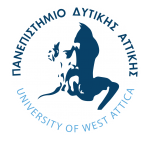Course info:
Semester: 3
General Foundation
ECTS: 6
Hours per week: 3
Professor: T.B.D.
Teaching style: Face to face, use of specialized software
Grading: Homework/Projects (60%), Written exam (40%)
| Activity | Workload |
|---|---|
| Lectures | 36 |
| Class assignments / projects | 42 |
| Independent study | 72 |
| Course total | 150 |
Learning Results
Upon successful completion of the course, students will be able to:
- Gain a historical perspective of AI and its foundations.
- Become familiar with basic principles of AI toward problem solving, inference, perception, knowledge representation, and learning.
- Investigate applications of AI techniques in intelligent agents, expert systems, etc.
- Explore the current scope, potential, limitations, and implications of intelligent systems.
Skills acquired
|
- Introduction to Artificial Intelligence, historic overview
- Blind search algorithms
- Heuristic search algorithms
- Game trees
- Constraint Satisfaction Programming
- Propositional Logic
- First-order Logic
- Reasoning
- Knowledge-based systems, expert systems
- Autonomous agents
- Applications
- Artificial Intelligence: A Modern Approach, Russel & Norvig, 4th Edition.
- Superintelligence: Paths, Dangers, Strategies, N. Bostrom 2014.
Related scientific journals:
- Artificial Intelligence
- IEEE Transactions on Artificial Intelligence
- AAAI Conference Proceedings
- Learning Results - Skills acquired
-
Learning Results
Upon successful completion of the course, students will be able to:
- Gain a historical perspective of AI and its foundations.
- Become familiar with basic principles of AI toward problem solving, inference, perception, knowledge representation, and learning.
- Investigate applications of AI techniques in intelligent agents, expert systems, etc.
- Explore the current scope, potential, limitations, and implications of intelligent systems.
Skills acquired
- Data and information retrieval, analysis and synthesis
- Decision making
- Individual work
- Team work
- New research ideas generation
- Promotion of free, creative and inductive thinking
- Course content
-
- Introduction to Artificial Intelligence, historic overview
- Blind search algorithms
- Heuristic search algorithms
- Game trees
- Constraint Satisfaction Programming
- Propositional Logic
- First-order Logic
- Reasoning
- Knowledge-based systems, expert systems
- Autonomous agents
- Applications
- Recommended bibliography
-
- Artificial Intelligence: A Modern Approach, Russel & Norvig, 4th Edition.
- Superintelligence: Paths, Dangers, Strategies, N. Bostrom 2014.
Related scientific journals:
- Artificial Intelligence
- IEEE Transactions on Artificial Intelligence
- AAAI Conference Proceedings
